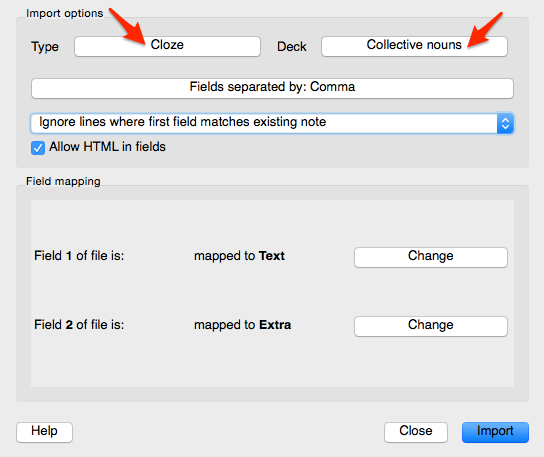Wikipedia to Anki deck
I looked at a list of Collective nouns in English and looked around for an Anki deck to study them. However, I found none.
Hence, I set about making one for myself: Collective nouns in English.
These are the steps I took to do this. Note that I was doing these things with the express intention of making it a quick and dirty, run once and throw-away script. There probably are better ways to do it, and if you know one, please tell me.
Step 1: Extract data
I used Google Spreadsheets for this task. It has a friendly ImportHtml function which can import almost any HTML table structure directly.
I did an import on B2 on this spreadsheet.
=ImportHtml("http://en.wikipedia.org/wiki/List_of_English_terms_of_venery,_by_animal",
"table", 1)Then I did a copy/paste-only-values to get rid of the Macro execution, did some Excel-fu with help from Shreyes and I had a fully filled CSV file with the data.
Step 2: Realize limitations
I wanted to create cloze deletion cards for each card. However, I noticed that there were several nouns possible for the same animal and the same noun may be used for more than one animal. Hence, there would be an ambiguity about which animal/noun was the correct answer. Since Anki does not support multiple answers for a single gap in Cloze Deletions, I decided to add minimal hints to the questions to remove ambiguity of which answer was needed.
One of the simplest ways of doing it was by leaving just enough characters in the prefix such that the answer was unambiguous.
For example, since a group of both ducks and dolphins can be called a team, the cloze deletion would read:
team of do[…]
or
team of du[…]
To remove the ambiguity. The python code for finding such a suffix is simple:
def minPrefixIdx(targetStr, strs):
# Remove the targetStr from strs, if it is present
strs = [ s for s in strs if s != targetStr ]
# If there is only one string, then no prefix is needed
if len(strs) == 0:
return 0
idx = 1
while idx < len(targetStr):
conflict = False
for s in strs:
# Target shares a prefix with another string
if targetStr[0:idx] == s[0:idx]:
conflict = True
break
if conflict:
idx += 1
else:
return idx
print >> sys.stderr, "Could not find a prefix: {0}, {1}".format(targetStr, str(strs))
# One string was almost a prefix of another
return NoneHowever, in some cases, it is not possible without giving away the whole answer. For example, you can use either tribe or trip as a collective noun for goats. In this case, we will have to give trip as the hint if we want to disambiguate it from tribe. There were three such cases:
- tribe/trip of goats
- dole of turtles/turtle doves
- rake/rag of colts
These had to dropped from the deck.
Step 3: Script it
I then wrote a python script to do the menial tasks of reading the csv file, removing the crud (e.g. the single character alphabets) and outputting a single CSV file.
Then I opened Anki, and imported the file to create the deck:

The import work smoothly. I synced with AnkiWeb, and shared the deck.
Conclusion
The entire process took about an hour of work. Almost half the time was spent figuring out which tool to use (I dabbled with BeautifulSoup before using Google spreadsheets) and the algorithm I wanted to use for disambiguation. Then another hour or so writing this blog post about it.